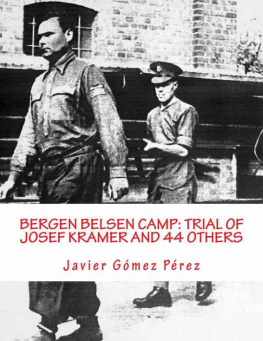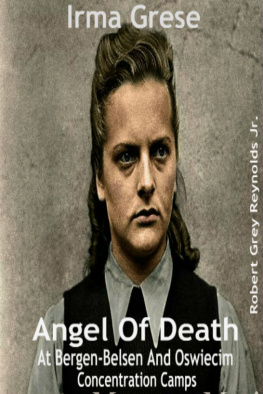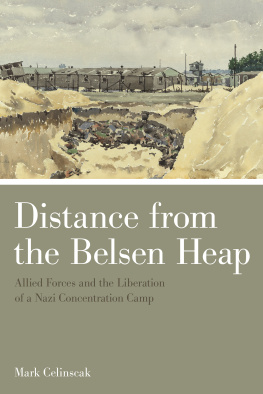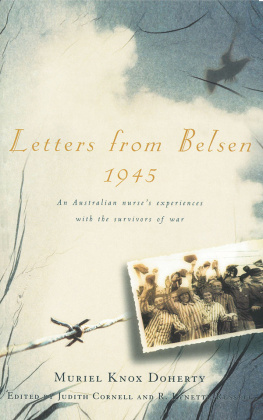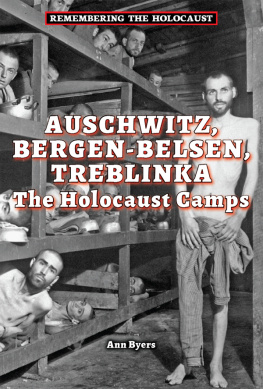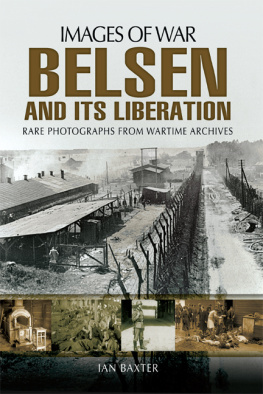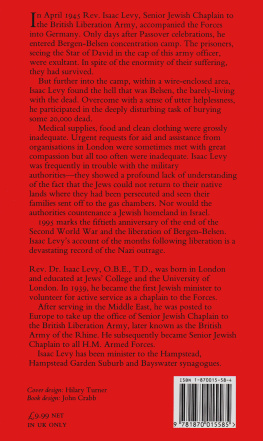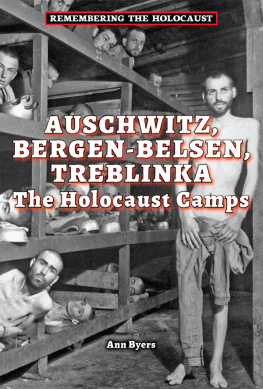Javier Gómez Pérez - Bergen Belsen Camp: Trial of Josef Kramer and 44 others
Here you can read online Javier Gómez Pérez - Bergen Belsen Camp: Trial of Josef Kramer and 44 others full text of the book (entire story) in english for free. Download pdf and epub, get meaning, cover and reviews about this ebook. year: 2014, publisher: CreateSpace Independent Publishing Platform, genre: Science fiction. Description of the work, (preface) as well as reviews are available. Best literature library LitArk.com created for fans of good reading and offers a wide selection of genres:
Romance novel
Science fiction
Adventure
Detective
Science
History
Home and family
Prose
Art
Politics
Computer
Non-fiction
Religion
Business
Children
Humor
Choose a favorite category and find really read worthwhile books. Enjoy immersion in the world of imagination, feel the emotions of the characters or learn something new for yourself, make an fascinating discovery.
- Book:Bergen Belsen Camp: Trial of Josef Kramer and 44 others
- Author:
- Publisher:CreateSpace Independent Publishing Platform
- Genre:
- Year:2014
- Rating:3 / 5
- Favourites:Add to favourites
- Your mark:
- 60
- 1
- 2
- 3
- 4
- 5
Bergen Belsen Camp: Trial of Josef Kramer and 44 others: summary, description and annotation
We offer to read an annotation, description, summary or preface (depends on what the author of the book "Bergen Belsen Camp: Trial of Josef Kramer and 44 others" wrote himself). If you haven't found the necessary information about the book — write in the comments, we will try to find it.
Bergen Belsen Camp: Trial of Josef Kramer and 44 others — read online for free the complete book (whole text) full work
Below is the text of the book, divided by pages. System saving the place of the last page read, allows you to conveniently read the book "Bergen Belsen Camp: Trial of Josef Kramer and 44 others" online for free, without having to search again every time where you left off. Put a bookmark, and you can go to the page where you finished reading at any time.
Font size:
Interval:
Bookmark:
CASE No. 10: THE BELSEN TRIAL
Bergen Belsen Camp: Trial of Josef Kramer and 44 others
BRITISH MILITARY COURT, LUNEBURG,
th SEPTEMBER-17 th NOVEMBER, 1945
FOREWORD
This is the first Report to be published in this series of the trials in respect of Concentration Camps. These camps were main instruments of terrorism and atrocity utilised by Hitler and his lieutenants, at first before the war within Germany while he was establishing the Nazi domination over his own nation (this was a necessary preliminary to his plan of dominating the world), and later, after his victories in Europe, were used to crush the resistance in the occupied countries and to remove people likely to give trouble, and, most appalling of all, to effect the mass destruction of races or peoples who were odious to the Nazi mind or impeded his purpose of securing lebensraum for the Nazis. The number of concentration camps increased enormously as the war went on so that at the end of the war there were over 300 in Germany and the occupied countries. Of these that at Auschwitz in Poland had an evil pre-eminence-in it at least 2,500,000 human beings (or as some say 4,000,000) were done to death by being poisoned in gas chambers. These unhappy people had been brought in railway trucks under horrible conditions from the occupied countries: they were the survivors of those who started. How many died on the way is unknown. This use of poison gas chambers was the outstanding feature of Auschwitz. Belsen, which was closely associated, was in Germany and shared with Auschwitz the normal characteristics of a German concentration camp-filth, starvation, absence of sanitation or adequate medical equipment, overwork, ill-usage of every kind, beatings, hangings, shootings and every form of inhumanity. The forty-five accused were alleged to have come from one or the other of these two camps. They were all tried in one case, the objections of the defending Counsel, who were all British except one Polish officer, being overruled.
The trial lasted from September 17 th to November 17 th , 1945, the Court meeting on 54 days, and was conducted with scrupulous patience and impartiality. The Court was a British Military Court, convened under the Royal Warrant, the terms of which are explained in the commentary to the present Report. Jurisdiction was asserted under the military law, which entitles the Court to punish war crimes, limited under the Royal Warrant to crimes against Allied nationals, if the accused have been captured or by surrender or extradition or otherwise are in the custody of the Convening Authority, the Commander-in-Chief. Neither the place in which the offence was committed nor the precise nationality of the victims was in this context material for giving jurisdiction. The victims were all Allied nationals from ten different Allied countries, so that it was impossible to have a national judge for each nationality, but seats were provided behind the bench for each of the ten nations so that any national representative might be able to attend. For a few days I occupied the seat marked for the British observer and could observe and admire the fairness of the trial, though I noted, as in other such cases, that fairness was not generally compatible with expedition. The Report here printed summarises the evidence with considerable fullness, which at least will enable future historians and lawyers to have a sufficiently full appreciation of the facts.
The Court acting under the Royal Warrant was careful to see that the victims were Allied nationals, but as their number ran into millions at Auschwitz and to tens of thousands at Belsen, it was impossible to state (as is usually done in murder trials) the names and identities of the great mass of the victims. The crimes were committed, in this as in other similar cases, in the occupied countries even though the victims had been deported from other countries and in many cases the period of their sojourn in the occupied country before they were gassed was very brief. They were, however, all the same under the protection of the Hague Convention, and also, if prisoners of war, of the Geneva Conventions.
The Royal Warrant did not cover crimes against peace or crimes against humanity.
The reader will find, I imagine, in the Report, all that he needs for understanding the facts, the law and the procedure and I shall say little in detail on these topics. I may, however, take this opportunity, perhaps rather by way of digression, of saying something about the effect which the disclosures to the world had on the prosecution of war crimes.
Auschwitz was attacked and recovered by the Russian forces on January 27 th , 1945. A very short time before that date Buchenwald had been reconquered. Buchenwald was the first concentration camp to be opened and exposed to the public eye. I remember how difficult it was before these disclosures to interest people in war crimes. When people were told of the doings in the occupied countries, the slaughters, tortures, massacres and so forth, they were generally uninterested and sceptical. Some wag had invented the term atrocity tale," as one would say travellers tale," and that was often enough to dispose of it. But the publicity given to Buchenwald and the other camps made a profound impression. The Houses of Parliament sent a delegation almost at once to inspect and report on Buchenwald; so also did this Commission, and then soon afterwards a body of Congressmen from the United States came over for the same purpose. The feeling of the world was at last fully roused on this horrible topic. It was not indeed until August 8th, 1945, that the London Agreement was signed and with it the Charter of the International Military Tribunal which sat at Nuremberg. The indictment was lodged on the following October 8th, 1945. I cannot but think that the disclosures of the concentration camps helped to create that fuller detestation which carried with it support of the Prosecution, though indeed the great statesmen of the Allied nations had announced their intention to punish war crimes committed by the .Axis, and Mr. Justice Jackson, acting under President Truman, had already gone a good distance in organising the magnificent team of expert workers and the impressive local setting for the trial at Nuremberg.
It was not until October 1st, 1946, that the Tribunal delivered its judgment. When I reflect on the enormous quantity of work expended and the difficulties surmounted, I can confidently assert that not only was the actual achievement outstanding, but it was completed with record expedition. Behind it was a strong surge of public enthusiasm to which the concentration camps, which figure so largely in the judgment of the Tribunal, immensely contributed. Perhaps the wave of popular abhorrence has abated and is dying away. The British at least are poor haters. Britain has not been occupied or conquered. Memories are short. Immediate problems and necessities crowd out thought for what is past. The idea of retributive justice becomes cold and repelling. But at least a great deal has been actually accomplished, even though the closing of the chapter is now not far distant. All the crimes cannot be brought up or punished. The Nuremberg Judgment, however, and all the judgments of which that now reported is one specimen, and also what are called the subsequent proceedings at Nuremberg, that is, the decisions given on the trials organised by General Telford Taylor, are at least solid witnesses that there is an international criminal law of war crimes. That is a welcome contrast to what happened in 1919. In the 1914-1918 war much the same atrocities, at least in their atrocious character though not in their extent, were perpetrated by the Germans as in the last war. But there was no real or serious attempt by the Allied nations to vindicate practically law or justice. Hence came what has been called the Leipzig fiasco. A lame and impotent conclusion. The sceptic is likely to say that it made no difference to the conduct of the Germany in 1939-the enthusiast may not be too confident in contradiction. Though much more might have been done to effect justice enough has been achieved to vindicate its reality and effectiveness. The hard-boiled exponents of a traditional international law (or no law) may perhaps still say that the Nuremberg trial and all the others were misconceived and erroneous. Others, including myself, will maintain the contrary. Securus judicat orbis terrarum. Future generations will assuredly not let this achievement die or its lesson be lost.
Next pageFont size:
Interval:
Bookmark:
Similar books «Bergen Belsen Camp: Trial of Josef Kramer and 44 others»
Look at similar books to Bergen Belsen Camp: Trial of Josef Kramer and 44 others. We have selected literature similar in name and meaning in the hope of providing readers with more options to find new, interesting, not yet read works.
Discussion, reviews of the book Bergen Belsen Camp: Trial of Josef Kramer and 44 others and just readers' own opinions. Leave your comments, write what you think about the work, its meaning or the main characters. Specify what exactly you liked and what you didn't like, and why you think so.

